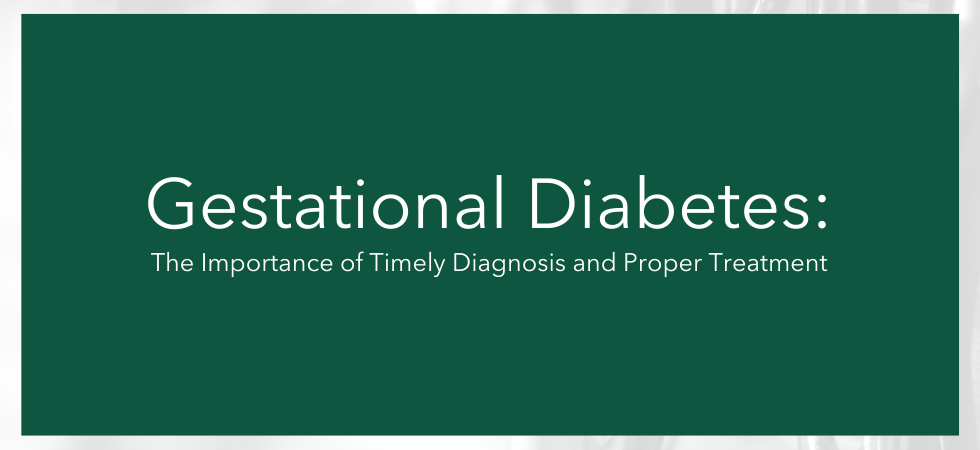Gestational diabetes is a condition in which elevated blood sugar (glucose) levels develop during pregnancy. Gestational diabetes usually resolves after pregnancy. According to the American Diabetes Association (ADA), nearly 10 percent of pregnancies in the U.S. are affected by gestational diabetes each year. If timely diagnosed and properly managed, a pregnancy complicated by gestational diabetes, should have a good outcome for both the mother and baby. If gestational diabetes is not diagnosed and properly managed by an obstetrician, it can be result in serious injuries to the mother and baby.
Who is at risk for gestational diabetes?
Every pregnant woman should be screened for gestational diabetes during pregnancy. Some women are at an increased risk for developing gestational diabetes. Reported risk factors include, obesity, gestational diabetes in a previous pregnancy, advanced maternal age (over 35) and excessive weight gain during pregnancy. There is a higher incidence of gestational diabetes in Asian, Native American, African American and Hispanic women.
If a mother or baby suffers injures resulting from undiagnosed gestational diabetes, an obstetrician may be held liable in an obstetrical negligence lawsuit. In a woman without pre-existing diabetes, screening for gestational diabetes should be done between 24 and 28 weeks of pregnancy. Usually, the obstetrician will begin with a simple glucose screening blood test. The mother drinks a liquid containing sugar (glucose). Blood is drawn one hour later. If the blood sugar level is abnormally high, the obstetrician will order a three-hour glucose tolerance test. With a three-hour glucose tolerance test, blood is drawn at the beginning of the test and then the mother drinks liquid containing glucose. Blood is then drawn every 60 minutes for three hours. If the blood sugar levels are high, the diagnosis of gestational diabetes is confirmed.
What can happen to mothers and babies if gestational diabetes is not properly managed?
If not properly managed, gestational diabetes can lead to problems in both the baby and the mother leading to an obstetrical negligence lawsuit. Babies of mothers with gestational diabetes can be born early (preterm). Babies of mother with gestational diabetes can have excessive weight at birth. This condition is called macrosomia. A macrosomic infant can have trouble passing through the birth canal. The shoulder of a macrosomic infant can get caught on the mother’s pelvic bones (shoulder dystocia) resulting in permanent nerve injuries in the baby’s shoulder and arm (brachial plexus injury). Large infants can also have low blood sugars at birth (hypoglycemia) which can cause brain damage. Unfortunately, there is higher risk of stillbirth among infants of diabetic mothers.
Mothers are at risk too when gestational diabetes is not properly managed. The cause of injuries to the mother is usually the result of a large baby. A large baby can cause problems during labor, trauma to the birth canal (tears) and bleeding after delivery (post-partum hemorrhage). There is a higher Cesarean section rate in mothers with gestational diabetes. High blood pressure and preeclampsia can also develop in a woman with gestational diabetes.
What happens during pregnancy once gestational diabetes is diagnosed?
Once gestational diabetes is diagnosed, the pregnancy must be closely monitored with frequent prenatal visits. Mothers with gestational diabetes must monitor their blood sugar levels. A healthy diet and exercise may be all that is needed to treat the gestational diabetes. The mother may be referred to a dietician for dietary counseling. If diet and exercise are not effective in controlling the gestational diabetes, oral medications will be ordered. If oral medications fail, insulin injections may be necessary.
In addition to closely monitoring the mother, the obstetrician should closely monitor the baby. Additional testing may be done to check the well-being of the baby at prenatal visits. Ultrasounds will be done to monitor the size and growth of the baby. If the baby is getting too large due to the gestational diabetes, labor may be induced early before the due date. If the obstetrician determines the baby is too large to pass through the birth canal, a Cesarean section will be recommended for the health of the mother and baby.
What to do if you’ve been injured from the improper management of gestational diabetes?
The attorneys at Clifford Law Offices have the extensive expertise needed to ensure that a mother and baby injured by the mismanagement of gestational diabetes by an obstetrician, receive full and fair compensation. Because of the special nature and complexity of cases involving gestational diabetes, you need experienced and dedicated attorneys. You need attorneys who have the time and resources to consult with obstetrical experts specializing in gestational diabetes to present the case to the jury in a manner allowing for a full recovery. The attorneys at Clifford Law Offices are committed to fighting for mothers and babies who have been injured from the improper management of gestational diabetes. They have the knowledge, expertise, and a long record of success in handling casing involving gestational diabetes. If you or your baby suffered an injury resulting from gestational diabetes, please call us today at 312-899-9090. We are here to help you.

